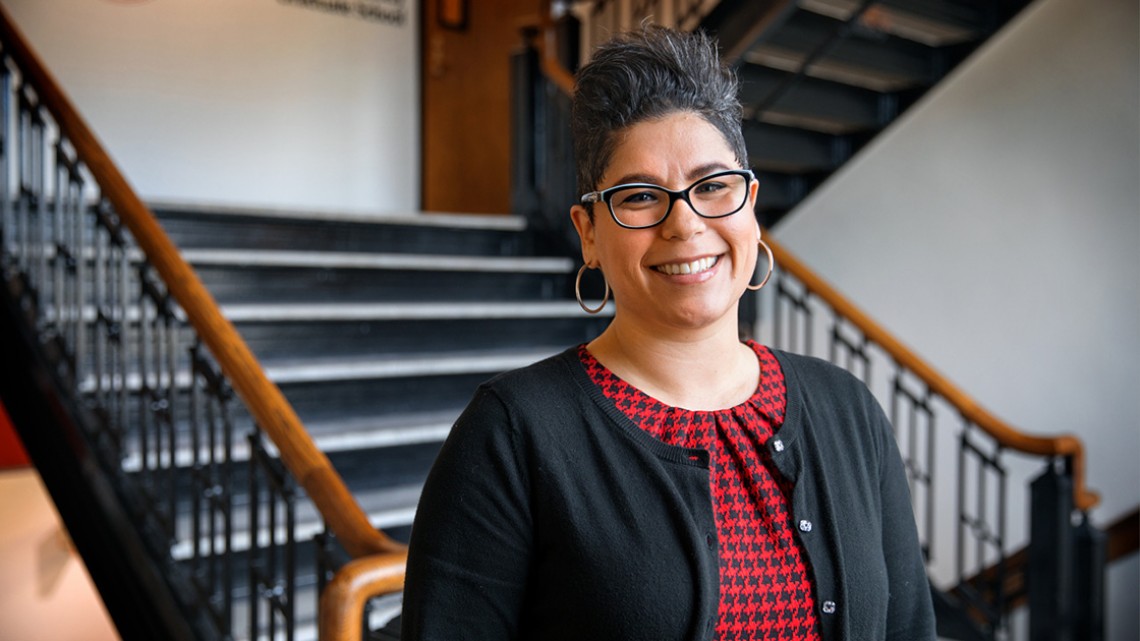
Sara Xayarath Hernández, associate dean for inclusion and student engagement, in Caldwell Hall.
Disability need not define achievement, Hernández says
By Nancy Doolittle
It’s not obvious, but Sara Xayarath Hernández, associate dean for inclusion and student engagement in the Graduate School, has a disability. In 2008, three years after joining the staff of Diversity Programs in Engineering (DPE), she was diagnosed with chronic myeloid leukemia.
She recently began speaking about her experiences in managing a mostly nonobvious disability and is featured in Cornell’s “Diversity includes Disability” poster campaign for the month of March. “The more we can normalize things – what disability looks like and how it is experienced – the better,” she said.
For Hernández, not only does diversity include disability, disability includes diversity. “Not everyone realizes that chronic health conditions are included under the definition of disability,” she said. “How that impacts people who have chronic conditions and the way those conditions affect them may be highly variable, depending on their treatment or how progressive the condition may be.”
Having a chronic health condition has not negatively affected Hernández’s career trajectory. While dealing with the challenges of her condition in 2009, Hernández became director of Diversity Programs in Engineering. In 2011, under her leadership, DPE was recognized by President Barack Obama with a Presidential Award for Excellence in Science, Mathematics and Engineering Mentoring. She has been associate dean at the Graduate School since 2015.
At times, especially when she was first diagnosed and during relapses, Hernandez’s condition has been challenging. At present it is controlled, doesn’t limit her physical abilities and doesn’t require ongoing accommodation. She sometimes experiences complications related to the side effects of treatment, altering how she feels and what she is able to do.
Hernández finds it frustrating when people who learn of her disability say, “but you look fine.” Most days she is fine, but a nonobvious disability is, by definition, not obvious. “Just because you look fine does not mean you’re not experiencing very real challenges in other ways,” she said.
Hernández said the College of Engineering and the Graduate School have been tremendously supportive as she has worked through those challenges. Diversity Programs in Engineering “has always been a professional organization with high achievers trying to do a lot of work, but it has also been very familial in nature. It was an environment in which I felt comfortable sharing with my colleagues what was going on. I was never treated differently; no one questioned whether I’d be able to maintain the level of work required.” Hernández credited the college with providing flexible accommodations and appreciated her staff, who carried forward in her absence so that the students would not feel a gap in services.
Shortly after Hernández accepted her current position at the Graduate School, she learned she was pregnant. She worked through the majority of her pregnancy before taking time off for the birth of her daughter and a relapse of leukemia that followed. “My colleagues and Dean (Barbara) Knuth have been tremendously supportive,” she said.
Hernández said her nonobvious disability has made it easier for students to talk with her about their disabilities. “Not all students that I work with know the various challenges I’ve navigated, but it occasionally comes up in different conversations. There is dramatic diversity in the types of physical and mental health-related challenges that our students are managing, and a moment of empathy can help,” she said.
Hernández advises students to use the network of support available on and off campus to request an accommodation or health care leave if necessary. “One of the most important things I will tell them – or anyone – is that having a disability does not necessarily create limitations on what one is able to achieve. And that’s regardless if it’s a nonobvious disability or one that may be visible,” she said.
Media Contact
Get Cornell news delivered right to your inbox.
Subscribe